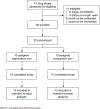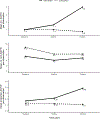Reaching Adolescent Girls and Young Women With HIV Self-Testing and Contraception at Girl-Friendly Drug Shops: A Randomized Trial in Tanzania
- PMID: 36241492
- PMCID: PMC9893895
- DOI: 10.1016/j.jadohealth.2022.08.013
Reaching Adolescent Girls and Young Women With HIV Self-Testing and Contraception at Girl-Friendly Drug Shops: A Randomized Trial in Tanzania
Abstract
Purpose: We hypothesized that an intervention designed to create girl-friendly drug shops would increase access to sexual and reproductive health products and services among adolescent girls and young women (AGYW) (ages 15-24 years) in Tanzania.
Methods: We conducted a four-month randomized trial at 20 drug shops in Shinyanga, Tanzania from August-December 2019 to determine if the Malkia Klabu ("Queen Club") intervention increased AGYW patronage and the provision of HIV self-testing (HIVST), contraception, and health facility referrals to AGYW (primary outcomes). Drug shops were randomized 1:1 to the intervention or comparison arm. All shops were provided with OraQuick HIVST kits to give to AGYW for free. Intervention shops implemented Malkia Klabu, a loyalty program for AGYW created using human-centered design through which AGYW could also access free contraception. We compared outcomes in intention-to-treat analyses using shop observations and shopkeeper records.
Results: By endline, shops implementing Malkia Klabu had higher AGYW patronage than comparison shops (rate ratio: 4.4; 95% confidence interval: 2.0, 9.8). Intervention shops distributed more HIVST kits (median per shop: 130.5 vs. 58.5, P = .02) and contraceptives (325.5 vs. 7.0, P < .01) to AGYW and provided more referrals for HIV, family planning, or pregnancy services combined (3.5 vs. 0.5, P = .02) than comparison shops.
Discussion: The Malkia Klabu intervention increased AGYW patronage and the provision of HIVST kits, contraception, and referrals to AGYW at drug shops, despite HIVST kits being freely available at all participating shops. Enhancing drug shops with girl-friendly services may be an effective strategy to reach AGYW with sexual and reproductive health services.
Trial registration: ClinicalTrials.gov NCT04045912.
Keywords: Adolescent girls and young women; Contraception; Drug shops; HIV self-testing; Human-centered design; Tanzania.
Copyright © 2022 Society for Adolescent Health and Medicine. Published by Elsevier Inc. All rights reserved.
Conflict of interest statement
Figures


Similar articles
-
Designing for two: How enhancing human-centered design with behavioral nudges unlocked breakthroughs to promote young women's psychological safety and access to reproductive care in Tanzania.Soc Sci Med. 2023 Mar;320:115683. doi: 10.1016/j.socscimed.2023.115683. Epub 2023 Jan 14. Soc Sci Med. 2023. PMID: 36709692 Free PMC article.
-
"They call me the 'Great Queen'": implementing the Malkia Klabu program to improve access to HIV self-testing and contraception for adolescent girls and young women in Tanzania.Reprod Health. 2024 Feb 7;21(1):21. doi: 10.1186/s12978-024-01744-x. Reprod Health. 2024. PMID: 38321482 Free PMC article.
-
Supporting young women's health through girl-friendly drug vendors in Lake Zone, Tanzania: protocol for the AmbassADDOrs for Health cluster-randomised controlled trial.BMJ Open. 2024 Jun 8;14(6):e078755. doi: 10.1136/bmjopen-2023-078755. BMJ Open. 2024. PMID: 38851225 Free PMC article.
-
Prioritizing the sexual and reproductive health and rights of adolescent girls and young women within HIV treatment and care services in emergency settings: a girl-centered agenda.Reprod Health. 2019 May 29;16(Suppl 1):57. doi: 10.1186/s12978-019-0710-0. Reprod Health. 2019. PMID: 31138222 Free PMC article. Review.
-
The prevalence of pregnancy among adolescent girls and young women across the Southern African development community economic hub: A systematic review and meta-analysis.Health Promot Perspect. 2020 Nov 7;10(4):325-337. doi: 10.34172/hpp.2020.51. eCollection 2020. Health Promot Perspect. 2020. PMID: 33312928 Free PMC article. Review.
Cited by
-
Designing for two: How enhancing human-centered design with behavioral nudges unlocked breakthroughs to promote young women's psychological safety and access to reproductive care in Tanzania.Soc Sci Med. 2023 Mar;320:115683. doi: 10.1016/j.socscimed.2023.115683. Epub 2023 Jan 14. Soc Sci Med. 2023. PMID: 36709692 Free PMC article.
-
"They call me the 'Great Queen'": implementing the Malkia Klabu program to improve access to HIV self-testing and contraception for adolescent girls and young women in Tanzania.Reprod Health. 2024 Feb 7;21(1):21. doi: 10.1186/s12978-024-01744-x. Reprod Health. 2024. PMID: 38321482 Free PMC article.
-
Exploring preferences to accessing sexual and reproductive health services: A qualitative study of adolescents' and service provider perspectives.PLoS One. 2024 Dec 4;19(12):e0312872. doi: 10.1371/journal.pone.0312872. eCollection 2024. PLoS One. 2024. PMID: 39630616 Free PMC article.
-
Supporting young women's health through girl-friendly drug vendors in Lake Zone, Tanzania: protocol for the AmbassADDOrs for Health cluster-randomised controlled trial.BMJ Open. 2024 Jun 8;14(6):e078755. doi: 10.1136/bmjopen-2023-078755. BMJ Open. 2024. PMID: 38851225 Free PMC article.
-
Feasibility, acceptability and preliminary effect of a community-led HIV self-testing model among adolescent girls and young women in Rural Northern Uganda: a quasi-experimental study protocol.Implement Sci Commun. 2024 May 21;5(1):56. doi: 10.1186/s43058-024-00596-7. Implement Sci Commun. 2024. PMID: 38773505 Free PMC article.
References
-
- WHO Regional Office for Africa. Report of an Adolescent Health Services Barriers Assessment (AHSBA) in the United Republic of Tanzania: With a Focus on Disadvantaged Adolescents. WHO Regional Office for Africa; 2019. Accessed October 30, 2020. https://apps.who.int/iris/bitstream/handle/10665/324924/9789290234302-en...
-
- Fleischman J, Peck K. Addressing HIV Risk in Adolescent Girls and Young Women. Center for Strategic & International Studies; 2015. Accessed October 30, 2020. https://iogt.org/wp-content/uploads/2015/03/Addressing-HIV-Risk-in-Adole...
-
- Nyblade L, Stockton M, Nyato D, Wamoyi J. Perceived, anticipated and experienced stigma: exploring manifestations and implications for young people’s sexual and reproductive health and access to care in North-Western Tanzania. Cult Health Sex. 2017;19(10):1092–1107. doi:10.1080/13691058.2017.1293844 - DOI - PubMed

